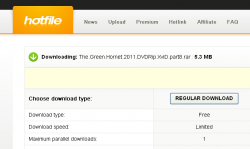Welcome to another edition of our annual Blu-ray sales analysis, even if this one is extremely late. My justification is that I wanted to make this more of a year-on-year comparison (so the whole of 2013 vs whole of 2014), as opposed to doing one in May (May being the first month that I’ve been keeping regular stats for Blu-ray sales). So this “State of Play” report is slightly different to ones in the past, and concentrates more on 2014’s results versus that of 2013.
Note that the last couple of weeks for 2014 is still missing, and so an update to this post will be made when these results come in, sometime during the middle of January.
The data used in this analysis derives from our weekly updates, based on figures released by Home Media Magazine. Some of the historical figures you’ll see have also been adjusted, due to slight tweaking of the metrics used by HMM to create these sets of data, although the changes have been very subtle and does not change the bigger picture in any way.
As per usual, this first set of graphs show Blu-ray market share (Blu-ray and combo market share as a percentage of all disc sales) through the six year period that I have tracked them, with the release milestones pointed out.

Blu-ray Sales Percentage – 4 May 2008 to 6 December 2014 – Click to see larger version
As the graph is getting perhaps a bit too wide, here’s a condensed version that allows you to see Blu-ray’s market share rise more clearly.
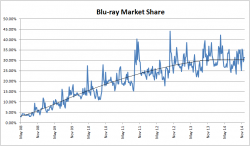
Blu-ray Market Share – 4 May 2008 to 6 December 2014
It’s interesting to look at the most recent additions to the “milestones”, or new releases that had a profound impact on Blu-ray weekly revenue or market share. There were many, but that’s mostly due to the extended period we’re covering in this report, but when you consider that the peak weekly Blu-ray market share has not been broken in all this time, and that the record remains with the week The Avengers was released back in September of 2012 (44.10%, re-adjusted), you can sort of start to come to a conclusion that Blu-ray’s growth has stagnated. The closest week to breaking the record came in the week that Frozen was released (42.16%), undoubtedly the biggest Blu-ray release in the year and a half covered by this analysis. The up and down nature of the weekly results show that market share, like revenue, is very much release dependent. A good “A-lister” this week or a Blu-ray exclusive can get market share and revenue rising fast, but a slow week, and it goes down again. But the rising trend is clear, especially in the second graph above.
We noted in the last State of Play report for the above graph that the “trendline just breaks above the 30% mark at the end of April 2013, and that’s probably a fair reflection of where Blu-ray market share is, or will be soon enough.” Looking at the trendline above, it is still just barely above 30%, although this will edge up a bit when the end of the year’s bumper week’s sales data are added. Amazingly, the average weekly Blu-ray market share figure was exactly 30.00% for the 85 weeks covered by this report, up from the 27.47% (re-adjusted) average weekly market share recorded from the last report period (April 2012 to April 2013). The 4-6% annual increase, seen previously, appears to be slowing down.
In the last report, I stated that:
It’s worth noting that Blu-ray’s rising market share has as much to do with DVD’s decline as it has to do with actual rise in Blu-ray sales, probably more so. The rise in spending in digital streaming and downloading is one of the major factors in the decline of DVD sales, in addition to the rising popularity of Blu-ray.
This is still very much true, although as you will slowly realise when you read the rest of this report, the rise of digital may now be having an effect on Blu-ray sales too. Here’s a graph plotting the current weekly market share (red) compared to the same week a year ago (blue):
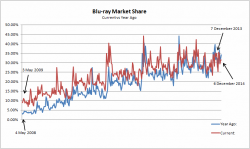
Blu-ray Sales Market Share: 2008/12 versus 2009/14 Comparison
The gap between the red line and the blue line above shows how much market share has jumped in that week compared to the same week a year ago. You’ll notice that towards the end of the graph, the two lines are getting closer and closer. In fact, the blue line is often above the red line for many of the weeks (ie. Blu-ray weekly market share has actually shrunk compared to a year ago). In other words, the growth in Blu-ray’s market share has slowed and even reversed in some cases. Obviously, this has to do with the caliber of weekly releases, but another take could be that whatever was causing DVD revenue to decline has stopped or slowed, or that the same factor is now causing Blu-ray revenue to decline or to remain steady. I believe digital is the factor here.
Let’s take a closer look at Blu-ray revenue for the same period.
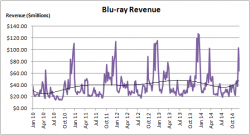
Blu-ray Revenue Growth – January 2010 to December 2014
The graph above clearly shows that Blu-ray revenue peaks during the holiday sales period (of which we are still missing 2014’s, as obviously, it hasn’t finished yet. But there is a worrying dip between April and October of 2014, a dip that’s slightly lower than the same time from 2013.
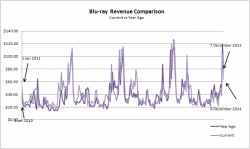
Blu-ray Sales Revenue: 2010/13 versus 2011/14 Comparison
The same trend is visible in the graph above. Just like with the market share graph further above, this comparison graph compares each week’s Blu-ray revenue with that from a year ago. The normal situation should see the lighter purple line always above the darker line (as this indicates Blu-ray revenue growth), but look at the 2014 period on the graph, and you will see quite a few times where the darker line is above the lighter line (indicating Blu-ray revenue has fallen). The overall trend is that Blu-ray revenue growth has stagnated, or even fallen from week-to-week, during 2014.
Now let’s take a closer look at the comparison between calendar 2013 and 2014 (so far).
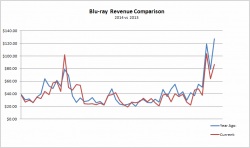
Blu-ray Sales Revenue: 2013 vs 2014 Comparison
The relatively poor results in 2014 can be seen much clearer in the above graph, with many weeks in 2014 being lower in revenue than the same weeks in 2013. Obviously each week’s releases ultimately determine market share and revenue, but it’s hard to ignore a trend that has been fairly consistent over an entire year. (Update: the graph above and below have both been updated to include data from the rest of 2014)
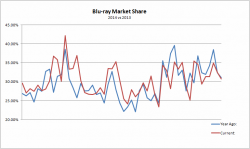
Blu-ray Sales Market Share: 2013 vs 2014 Comparison
The same trend is there, but less pronounced for market share, although the problem appears to be worse for the last couple of months (this could be due to a strong release slate during this time in 2013 and/or a weaker release slate for the same period in 2014).
Looking at the raw numbers, this is where things become a lot more clearer. Out of the 52 weeks for 2014, 35 of them had the weekly revenue lower than the same week in 2013. Only 17 weeks recorded a revenue result that was higher than the same week in 2013. The situation is completely reversed when you look at 2012 vs 2013 results, where 35 week had higher revenue compared to 17 weeks with lower. Looking at total sales though, 2014’s Blu-ray sales total has declined compared to 2013, $2.122 billion versus $2.306 billion. This is the first year-on-year decline since Blu-ray’s launch in 2006 (the above information has been updated to include the rest of the weeks for 2014)
Conclusion:
To sum up:
- Blu-ray market share is growing, but at a much slower rate than the past few years
- Frozen was the top seller in the last year and a half, but failed to beat the weekly market share record set by The Avengers in 2012
- Blu-ray revenue has declined from 2013 to 2014.
Although we still have a couple of (big) weeks to go, unless these prove to be exceptional and record breaking, it does look like 2014, at best, would be a year where Blu-ray growth stalled. Blu-ray revenue may even be in decline, but its market share is still growing slightly thanks to DVD’s faster decline.
Update: Now that data for the rest of 2014 is available, Blu-ray revenue did indeed record a year on year decline, the first since the format’s inception. Now, the falling average price of Blu-ray titles will be a contributing factor to the overall revenue decline (so a situation where more discs are sold, but each are cheaper, may exist), but for a format that has marked steady growth year after year, this year’s decline is still very much a notable event.
As for the other reasons for 2014’s lackluster Blu-ray results, most data support the growth of digital as being the catalyst for disc’s fall. Or it could be the releases themselves that are to blame, although a 2014 line-up that includes ‘Frozen’, ‘The Hunger Games: Catching Fire’, ‘Thor: The Dark World’, ‘Maleficent’, ‘The Lego Movie’ and ‘The Hobbit: The Desolation of Smaug’, doesn’t sound like such a poor year. There is no doubt about it – 2014 is the year that Blu-ray went backwards.


